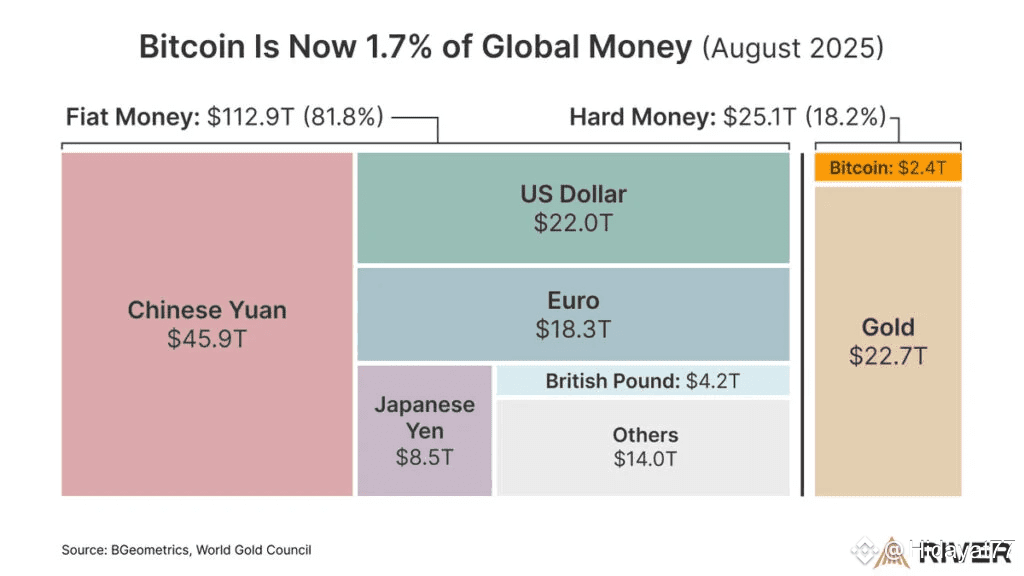Bitcoin (BTC) is quietly changing the global financial landscape. According to the latest data from Bitcoin services company River, earlier this month, BTC's market cap reached 1.7% of the world's money supply, reaching a historic high. This milestone comes as Federal Reserve Chairman Powell has been undecided on interest rate policy, even suggesting that a new round of monetary easing is imminent. Bitcoin's market cap surpassed $2.4 trillion, accounting for 1.7% of the global currency market.

In a short 16 years, Bitcoin has grown from an internet wonder used to exchange pizzas to a global currency network worth 2.4 trillion dollars. Basic Comparison: Global fiat currency M2: approximately 112.9 trillion US dollars Gold market cap: approximately 25.1 trillion US dollars (excluding silver, platinum, and palladium) With a current market cap of 2.29 trillion US dollars, BTC has a share of approximately 1.66%–1.7%. Rivers emphasized that this is not a short-term speculative rebound, but rather a process by which Bitcoin is gradually becoming a permanent part of the global asset balance. Central banks cannot stop printing money, the value of hard currencies is increasingly prominent Bitcoin's rise is no accident. Central banks in various countries have been continuously injecting liquidity for more than a decade, each time interest rate cuts and quantitative easing further erode the purchasing power of fiat currencies. Investors are increasingly shifting their funds to hard currency assets such as Bitcoin and gold, to protect against the risk of currency depreciation.
Powell hints at rate cuts at Jackson Hole, BTC reacts quicklyAt the Jackson Hole economic symposium, Powell stated: "Our policy rate is currently closer to the neutral level of 100 basis points compared to a year ago, and the stability of the labor market allows us to act cautiously as we consider changing our policy stance." Following Powell's speech, BTC rose 2% briefly to $116,000, but then weakened. CME futures data shows that 75% of investors expect interest rates to be cut by 25 basis points in September. Why this is a historical shiftBitcoin is no longer just a fringe hedge, but a global currency asset with a market capitalization of over $2 trillion, enough to stand alongside fiat currencies and gold.
Why this is a historical shift: Bitcoin is no longer just a fringe hedge, but a global currency asset with a market capitalization of over $2 trillion, enough to stand alongside fiat currencies and gold. Characteristics of a high-beta asset: Global currency expansion → Digital asset valuations rise accordingly. Long-term significance: In a monetary environment of "printing money and lowering interest rates," the rise in BTC's share represents a slow-moving monetary revolution. The question remains: Will central banks around the world choose to adapt to Bitcoin's rise, or continue to fuel its inevitable growth? Conclusion: Bitcoin accounts for over 1.7% of the global currency market, not only a milestone in data but also a signal of a shift in the global financial order. With Powell hinting at lower interest rates and the potential for further dollar dilution, BTC's long-term value proposition is becoming increasingly clear. For investors, this may be the best time to reconsider their Bitcoin allocation. For more in-depth analysis of the crypto market, please follow the official Gate.io platform.#BNBATH900 $BTC